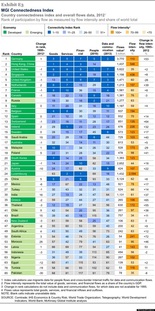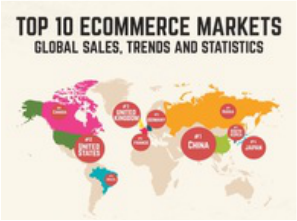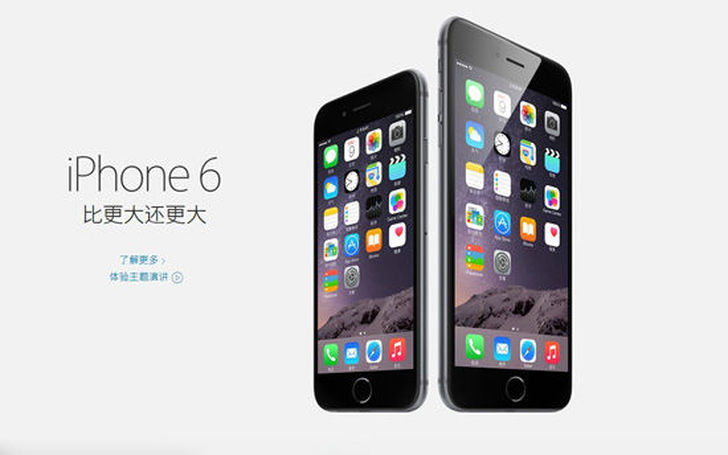|
When designing your online shopping experience, consider what platform your intended audience will use for purchases. In the U.S. and Europe, most consumers still use the desktop, with only 30% of U.S. e-commerce sales coming from mobile devices. However, within the U.S. there are large demographic differences. Surveys show that hispanics in the U.S. tend to shop far more on their mobile devices then other demographic groups, so if your products or services target that market, you should spend extra effort testing the user experience on a small phone with relatively slow speeds.
Keep in mind when planning for 2016 that mobile growth rates vary tremendously from country to country, and just like in the U.S. there will be pockets of consumers who have different shopping habits. So, when you localize the shopping experience for each market, do your homework and optimize for the type of buyer, the download speed, and the likely device. And don't forget to check our blog from November 3rd for advice on big shopping holidays around the world.
0 Comments
Global market expansion usually means working with teams in the new countries. These international teams are integral to the success of your projects and your company, and team leaders need to adjust how they manage their people in order to meet their goals.
1. Choose a corporate language. Most companies agree to conduct business meetings in English, if there are teams collaborating from multiple countries. While team members may not be fluent in English, chances are that everyone will know enough to get by. However, because English is not everyone's native tongue, when teams are on conference calls, the native English speakers need to speak slowly and clearly so that the international teams have a greater chance of following along and understanding what is said. 2. Be sensitive to cultural differences. In some cultures, it is impolite to disagree in public, or to jump into a conversation without being recognized first, or to present ideas that are not fully thought through. If you are leading the meeting, make sure you ask for input from your quieter team members. Explain offline to your international teams what you expect during meetings. Do you do a lot of brainstorming? Do you want ideas to be challenged in the moment? Set guidelines for in-meeting behavior that everyone understands. 3. Expanding on the cultural differences issue, consider bringing in a cultural awareness coach to talk to your teams about the difference in cultural norms between countries, and other business etiquette issues that you and your teams may not be aware of. Undergoing some training in these areas can really boost camaraderie among globally dispersed teams and improve productivity as people gain an understanding of how others work and communicate. 3. If at all possible, send out an agenda the day before your meetings so that whichever time-zone your team members are in, they will have adequate time to prepare. For standing meetings, follow the same format from meeting to meeting so that everyone knows what to expect. In some cultures, employees need to confer with their local management before jumping on a conference call with their global team. Give them the time they need to be prepared. 4. Reiterate what is said on the call. Summarize others thoughts and check that you and the group understood properly. Send out a list of action items after the meeting, and recap conclusions that were reached. Invite participants to ask clarifying questions and to tell you if they didn't understand what was said. Work to create a culture where it's okay to ask someone to rephrase or re-explain their thought. 5. Spend some time at the beginning of each call connecting team members on a more personal level. Give team members a chance to talk about what they did over the weekend, or what they're planning to do. Ask about an upcoming holiday celebration. Even the weather will do in a pinch. If you can re-create a water cooler feeling for a couple of minutes, it will help your team bond. 6. Establish how team members prefer to communicate when not on a call. Tools like Slack can be extremely useful for keeping everyone up to date, but they can also resemble a fire hose. Gain agreement on what should be emailed, how fast you expect team members to respond to email, what should happen in online forums, and appropriate hours for phone calls. The more aware you are of cultural differences, the more social norms you create that cross country and cultural boundaries, and the more you work to connect team members on a personal level, the more productive your global team will be. Boston’s busiest tourist season is about to hit full swing. This year the hub is expecting tourists and convention attendees from all over the world, with the tourism board predicting we’ll top last year’s visits of more than 1.4 million people(1). More than 100,00 of those visitors hailed from Germany and another 100,000+ from China. With new non-stop flights from Shanghai, businesses can almost certainly expect an increase in Chinese visitors this summer—good news since the average Chinese tourist spends $5,400 per visit to the U.S., the highest spending average in the world(2).
Take advantage of the summer season and set yourself apart by marketing to tourists in their own languages. Place translated brochures in area hotels, use advertisements in local native language newspapers to reach tourists who are visiting their relatives, and put signage in major tourism languages in your retail locations. Based on last year’s tourist demographics, you may want to concentrate on German, Mandarin, French, Japanese, Italian, and Portuguese. When planning your marketing strategy, don’t neglect social media. Tweet, post to Instagram, Facebook, and other social media channels in the major tourism and international business visitor languages. It’s a great way to offer discounts, create buzz, and raise your profile. You can be sure they will be checking those sites while they’re in town. If your budget extends to it, it’s not too late to advertise your businesses in overseas markets, including Chinese social apps WeChat and Weibo, so that visitors already have your destination in mind when they arrive. Localization companies like Red & Blue can help you craft and execute a marketing strategy to successfully target foreign visitors in their languages. We provide expert advice, on-site interpreters, high-quality translation, and localized promotional videos in all in-demand languages. Contact us to talk about how you can attract this summer’s influx of international tourists to your business. 1. Mass Office of Travel and Tourism, 2014 Report 2. http://www.ibtimes.com/golden-week-tourism-chinese-tourists-spend-lavishly-top-restaurants-1696824 THE AWKWARD TRANSLATION ON APPLE'S CHINESE WEBPAGE OF THE IPHONE6 TAGLINE. Author: Yvette Fang | CEO, RABI For one day and night, Chinese media and netizens were having a party with a theme: making fun of the simplified Chinese version of the main slogan for iPhone 6 because of its awkward language.
Why does Apple call the iPhone “Bigger than bigger?” Because, according to its website, "iPhone 6 isn’t simply bigger — it’s better in every way. Larger, yet dramatically thinner. More powerful, but remarkably power efficient." However, Apple’s Chinese version of the slogan is a word-to-word translation, which forms an awkward phrase and refers only to the actual size, not the added functionality. Translation has three levels, from low to high: faithfulness, expressiveness and elegance. Apple’s Chinese translation does not even reach the faithfulness stage, never mind expressiveness or elegance, despite Apple’s reputation in the U.S. for its marketing prowess. The translation has since been revised to a better reflect what Apple is trying to say, but not without having left its mark. In China, Apple competes against upstart cell phone maker Xiaomi, whose phones are known for being competitive in terms of functionality and inexpensive compared to the big brands. Apple’s translation snafu has led to Chinese consumers debating whether they should purchase a phone that is “bigger than bigger in size,” and missing the point that the phone also offers functions that cheaper imitations don’t provide. Most of us, at one time or another have had a similar experience, where we encountered an advertising slogan that made no sense or didn’t explain the value in a way that spoke to us. It is like hearing a song which does not touch your heart. If it doesn’t ring true, you won't buy it. When selling premium products and services in foreign market, using a premium local language service is key. Subtle language nuances can make all the difference in relating thoughts and information. Steve Jobs used to scratch iPhone screens with a key to test the material. If Apple had taken the time to test their marketing message like they did their product, they would not have damaged their reputation and confused their customers.
 Go-Globe.com's Chinese social media infographic shows that Chinese consumers are strongly influenced by social media. 91% of the Chinese population uses social media, as compared to only 67% of the U.S. population, and 38% say they make decisions based on recommendations from their social network. View the entire infographic here: http://www.go-globe.com/blog/social-media-china/  Economies thrive on the global exchange of goods, services, people and information. The U.S. used to head the list of globally connected countries, but the latest data from McKinsey Global Institute and the McKinsey High Tech Practice shows that Germany now tops the chart followed by Hong Kong. The U.S. has sunk to 3rd place. And what about global powerhouse China? It is in 25th place, largely due to restrictions on the flow of people and information. Why does global connectedness matter? This research shows that the more connected a country is, the faster it's GDP grows.  A Harvard Business School study examined the present and future tense constructions of different languages and discovered people who speak languages whose tense constructs were similar prepare better for the future than those who speak languages that have different structures for present and future tenses. What does that mean? If you speak French, English, or Korean you're more likely to be obese, less likely to save for retirement, and less likely to take actions to stave off climate change. Swedes, Germans, and Chinese are more likely to take actions today that are socially responsible for the future. The good news? As a corporation becomes more global, the language effect decreases. One more reason to hire with diversity in mind. http://hbswk.hbs.edu/item/7479.html This great video has some amazing facts that will astound you! Did you know:
Watch this cool video for more fun facts! Chinese Companies Are Poised to Go West  Joel Backaler, author of “China Goes West: Everything You Need to Know About Chinese Companies Going Global discusses why so few Chinese companies have successfully taken their brands global and how that is going to change in the near future. Don't miss this insightful video about the coming power of Chinese brands. http://show.thoughtfulchina.com/china-goes-west-en.html |
Author
Archives
March 2024
Categories
All
|
Photos from : : Ys [waiz] : :, bjahind, fabola, MattysFlicks, @sage_solar, LoS, Traducción e Interpretación, Kyle Taylor, Dream It. Do It., _gee_, keepitsurreal, One Way Stock, Airviewsphotos, GotCredit, efile989, Benoit cars, ** RCB **, stephiesal853, Francisco Anzola, Highways England, ITU Pictures, VIPevent, leoplus, Karsten Bitter, Jolante, jobstop11, Nguyen Vu Hung (vuhung), jurvetson, mikefats, YooSan, sandrafdzh, roland, mikecogh, y entonces, Donald Lee Pardue, Gatorgoon, daniel0685, BÜNDNIS 90/DIE GRÜNEN, rick, {Guerrilla Futures | Jason Tester}, mikecogh, markyharky, amslerPIX, jo.sau, IAEA Imagebank, lisa-skorpion, Toronto Public Library Special Collections, Wootang01








 RSS Feed
RSS Feed
